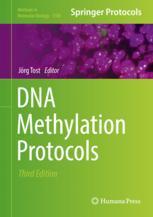

Most ebook files are in PDF format, so you can easily read them using various software such as Foxit Reader or directly on the Google Chrome browser.
Some ebook files are released by publishers in other formats such as .awz, .mobi, .epub, .fb2, etc. You may need to install specific software to read these formats on mobile/PC, such as Calibre.
Please read the tutorial at this link: https://ebookbell.com/faq
We offer FREE conversion to the popular formats you request; however, this may take some time. Therefore, right after payment, please email us, and we will try to provide the service as quickly as possible.
For some exceptional file formats or broken links (if any), please refrain from opening any disputes. Instead, email us first, and we will try to assist within a maximum of 6 hours.
EbookBell Team

5.0
50 reviewsThis third edition volume expands on the previous editions by providing a comprehensive update on the available technologies required to successfully perform DNA methylation analysis. The different technologies discussed in this book analyze the global DNA methylation contents, comprehensive analyses using various NGS based methods for genome-wide DNA methylation analysis, along with precise quantification of DNA methylation levels on single CpG positions. The chapters in this book are divided into 7 parts: an introduction to the field along with tips on study design and data analysis; global DNA methylation levels; genome-wide DNA methylation analysis; highly multiplexed target regions; locus-specific DNA methylation analysis; DNA methylation analysis of specific biological samples; and hydroxymethylation. Written in the highly successful Methods in Molecular Biology series format, chapters include introductions to their respective topics, lists of the necessary materials and reagents, step-by-step, readily reproducible laboratory protocols, and tips on troubleshooting and avoiding known pitfalls.
Cutting-edge and thorough, DNA Methylation Protocols, Third Edition is a valuable resource for postdoctoral investigators and research scientists who work with different aspects of genetics, and cellular and molecular biology, as well as clinicians who are involved in diagnostics or treatment of diseases with epigenetic components.